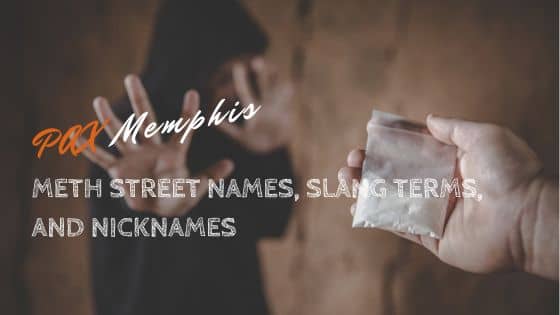Meth is a highly potent stimulant drug that can lead to an array of health issues when abused. Long-term meth abuse can lead to psychosis, dental decay, malnourishment, and even brain or organ damage.
According to the National Institute of Drug Abuse, “Among people aged 12 or older in 2021, 0.9% (or about 2.5 million people) reported using meth in the past 12 months,”[1]
If you are worried that your loved one is abusing meth, being aware of the slang terms and street names for this drug can be helpful. People often use nicknames for drugs to hide the fact that they are talking about them, so knowing these slang terms can help you determine whether someone you love is addicted to meth. (Ultram)
What are the Street Names and Slang Terms for Meth?
If you have been concerned that your loved one is abusing drugs, you may have noticed that they use slang terms to refer to substances. Oftentimes, it can be extremely difficult to determine what specific drugs a nickname is referring to if you are not in the drug scene yourself.
Street Names for Meth
When someone is referring to meth in a conversation or through text message, they may use code words to ensure that other people do not know what they are talking about. Dealers often use slang terms to prevent cops from being able to charge them with drug charges.
Street names for meth include:
- Speed
- Crank
- Tweek
- Uppers
- Chalk
- Christina
- Tina
- Crystal
- Cookies
- Cotton candy
- Go fast
- Gak
- Go juice
- No doze
- White cross
- Rocket fuel
- Scooby Snax
- Ice
- Shards
- Glass
- Poor man’s coke
- Redneck cocaine
Slang Terms for Meth Intoxication
When someone is talking about being high on meth, they might use slang terms as well. Knowing these nicknames for meth intoxication can help you determine if your loved one is discussing being high on the drug.
The street names for being high on meth include:
- Tweaking
- Chicken flipping
- Getting glassed
- Hot railing
- Hot rolling
- Going fast
- Geeking
Street Names for Meth Combined With Other Substances
People who abuse meth often mix the drug with other substances to create a different or more intense high. There are also nicknames for the mixtures of these drugs.
The street names for meth combined with other substances include:
- Biker coffee (meth and coffee)
- Shabu or croak (cocaine and meth)
- Twisters, fire, or Mexican speedball (crack and meth)
- Jet fuel (PCP and meth)
- Screwball or speedball (heroin and meth)
- Hugs and kisses (ecstasy and meth)
- Party and play (MDMA, meth, and Viagra)
- Five-way (meth, heroin, cocaine, Rohypnol, and alcohol)
Mixing meth with other substances can be incredibly dangerous. If you are combining meth with another stimulant, you are increasing your risk of experiencing seizures, heart attacks, and even strokes. On the other hand, mixing meth with a downer (depressant) can cause you to believe the meth is not working, causing you to take more of the substance and increasing the risk of an overdose.
Nicknames for Meth Paraphernalia
Lastly, people who abuse meth might use slang terms to describe their paraphernalia. To explain, paraphernalia are the tools used to create or abuse drugs.
The nicknames for meth paraphernalia include:
- Pookie or glass rose (meth pipe)
- Box or rolling labs (transportable laboratories to cook meth)
- Boat (tin foil folded up to create a makeshift meth pipe)
While there might be other nicknames that people have created to use among their small friend groups, these are the most common names used to describe meth paraphernalia.
Spotting the Signs of meth Addiction
If you hear your loved one using one of the street names or slang terms for meth, being aware of the signs of addiction is also helpful. Meth addiction is usually not easy to hide because of the symptoms this substance can cause, such as never sleeping, skipping meals, and experiencing significant paranoia.
Other signs of meth addiction include:
- Excessive movement
- Weird movements of the jaw and mouth
- Abnormal amounts of energy
- Anxious and paranoid behavior
- Talkativeness
- High body temperature and excessive sweating
- Lack of appetite or need for sleep
- Spending a lot of time thinking about, using, or recovering from the use of meth
- Isolating from friends and family
- Neglecting responsibility to use meth
- Experiencing strong cravings or urges to use meth
- Experiencing symptoms of withdrawal when they cannot consume meth
If your loved one displays the above-mentioned signs, they are most likely suffering from meth addiction. Meth addiction can cause severe side effects, making it vital that they receive help from a reputable addiction treatment program.
Find Help for Meth Abuse and Addiction
If you or a loved one require treatment for meth addiction, we can help you find a meth addiction treatment program that you can trust. At PAX Memphis, we understand the importance of finding a meth rehab facility that meets your specific needs, so we will work with you closely to determine which facility in your area will best suit your needs and goals for recovery.
To get connected with a meth addiction treatment center near you, contact PAX Memphis today.
References:
- The National Institute of Drug Abuse (NIDA): What is the scope of meth use in the United States, Retrieved July 2023 From https://nida.nih.gov/publications/research-reports/meth/what-scope-meth-misuse-in-united-states
Medically Reviewed: September 25, 2019

All of the information on this page has been reviewed and verified by a certified addiction professional.










